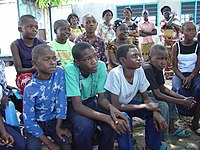User:Inayity/sandbox
Present demography[edit]

Bantu people are divided into hundreds of individual groups predominating demographically, culturally, linguistically and politically in a contiguous zone throughout most of Sub-Equatorial Africa,[1][2] specifically all the nineteen nations of Central, Southeast and Southern Africa.[3] also sometimes referred to as Bantu Africa.[4]
In Kenya and Uganda there are also significant remaining ancestral Nilo-Saharan communities, as these countries were the final points of the Bantu migration, and this cultural diversity has often led to ethnic conflict over the years for political and cultural dominance.[5][6]
The Islands of Africa also include some Bantu communities, including in the Indian Ocean states of Madagascar, Comoros, Seychelles and Mauritius off the southeastern coast of Africa as well as São Tomé and Príncipe off the southwestern seaboard.[7][8] There are also a few remaining Bantu communities in southern Cameroon, the major original dispersal point of the Bantu migration, comprising approximately 27 percent of the population of the country.[9] The most notable of these communities include the Beti-Pahuin, Bulu (a subgroup of Beti-Pahuin), Fang (a subgroup of Beti-Pahuin), Maka and Njem.[9]
Territories and regions[edit]
All of the nineteen Bantu majority countries are also (often overlapping) members of various regional organizations in Sub-Equatorial Africa. Among these are the Southern African Development Community (SADC) for the countries in Southern Africa,[10] the East African Community (EAC) for the countries in the Great Lakes Region,[11] and the Economic Community of Central African States (ECCAS) for the countries in Central Africa.[12] These regional organizations variously promote regional co-operation and economic, political and social integration amongst their members.
See also[edit]
- Bantu mythology
- Ubuntu (philosophy)
- Centre International des Civilisations Bantu (International Center for Bantu Civilizations)
- Candomblé Bantu
- Bantu Educational Kinema Experiment
Notes[edit]
- ^ J. D. Fage, Roland Anthony Oliver, The Cambridge History of Africa (1978), books.google.com/books?isbn=0521215927, p. 353
- ^ OECD, Sahel and West Africa Club, West African Studies Regional Atlas on West Africa (2009), p. 8, books.google.com/books?isbn=9264056769
- ^ Roland Oliver, et al. "Africa South of the Equator," in Africa Since 1800. Cambridge, UK: Cambridge University Press, 2005, pp. 18-34
- ^ Vincente Carlos Kiaziku, Consecrated Life in Bantu Africa (2007), books.google.com/books?isbn=9966082859
- ^ David E. Apter, The Political Kingdom in Uganda: A Study in Bureaucratic Nationalism (2013), p. 215, books.google.com/books?isbn=1136307648
- ^ Bethwell Ogot, Kenya: The Making of a Nation (2000), p. 175 books.google.com/books?id=3ldyAAAAMAAJ
- ^ Ronald James Harrison-Church, The African Islands of the Indian Ocean: The Comoro Islands, Madagascar, Réunion, Mauritius and Seychelles (1964), books.google.com/books?id=N8A2QwAACAAJ
- ^ Stewart Lloyd-Jones, The Last Empire: Thirty Years of Portuguese Decolonization (2003), books.google.com/books?isbn=1841501093
- ^ a b https://www.cia.gov/library/publications/the-world-factbook/geos/cm.html
- ^ http://www.sadc.int/about-sadc/overview/sadc-facts-figures/
- ^ Cite error: The named reference
eac.intwas invoked but never defined (see the help page). - ^ Cite error: The named reference
ceeac-eccas.orgwas invoked but never defined (see the help page).
References[edit]
- Christopher Ehret, An African Classical Age: Eastern and Southern Africa in World History, 1000 B.C. to A.D. 400, James Currey, London, 1998
- Christopher Ehret and Merrick Posnansky, eds., The Archaeological and Linguistic Reconstruction of African History, University of California Press, Berkeley and Los Angeles, 1982
- April A. Gordon and Donald L. Gordon, Understanding Contemporary Africa, Lynne Riener, London, 1996
- John M. Janzen, Ngoma: Discourses of Healing in Central and Southern Africa, University of California Press, Berkeley and Los Angeles, 1992
- James L. Newman, The Peopling of Africa: A Geographic Interpretation, Yale University Press, New Haven, 1995
- Kevin Shillington, History of Africa, 3rd ed. St. Martin's Press, New York, 2005
- Jan Vansina, Paths in the Rainforest: Toward a History of Political Tradition in Equatorial Africa, University of Wisconsin Press, Madison, 1990
- Jan Vansina, "New linguistic evidence on the expansion of Bantu", Journal of African History 36:173–195, 1995

